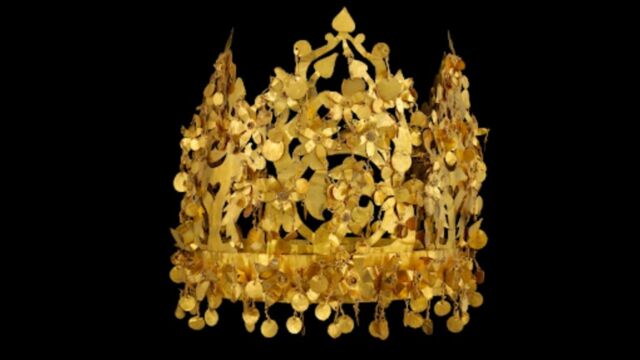Life in Afghanistan has drastically changed since the Taliban overthrew the government. There is still much uncertainty surrounding different aspects of life in the country, not only about the rights of women, but also about Afghanistan’s archaeological remains and cultural heritage. Will it survive in the hands of the Taliban?
Discover our latest podcast
This question is now increasingly important to experts in the field, especially since it has recently been revealed that the Islamic fundamentalist group is actively looking for one of the most famous collections of artefacts in Afghanistan.
The Bactrian treasure
The collection is said to consist of more than 20,000 pieces, mostly made of gold. It was unearthed in thousand-year-old tombs at the site of Tillya Tepe back in 1978. Tillya Tepe is also known as the ‘hill of gold’ which is located in the north of the country.
The collection was once housed in the National Museum of Afghanistan and displayed in the presidential palace, however its latest location is unknown. The growing concern is that if the Taliban gets their hands on the precious piece of historical treasure, they may seize and destroy it.
The Taliban had already done the same in 2001 when they used rockets and dynamite to obliterate the famous Buddhas of Bamiyan. They were two Buddhist statues which were a testament of the country’s pre-Islamic past, and they were known to be one of Afghanistan’s most prized monuments.
Archaeological sites under threat
Other sites of incredible archaeological wealth could also suffer under the wrath of the Taliban government. In particular, Mes Aynak—a Buddhist city that flourished around 1,600 years ago. It’s located 35 km south of Kabul and is known to be home to many monasteries and ancient artefacts. Julio Bendezu-Sarmiento, former French Archaeological Delegation to Afghanistan, said that the Taliban had previously visited the site, but their intentions for it are still unknown.
Khair Muhammad Khairzada, archaeologist who led excavations at Mes Aynak, said that all sites in Afghanistan are currently unprotected and at risk. He said, as quoted by Live Science:
The situation for culture heritage is not OK, because right now no one is taking care of the sites and monuments.
All archaeological sites in Afghanistan are [at] risk.















